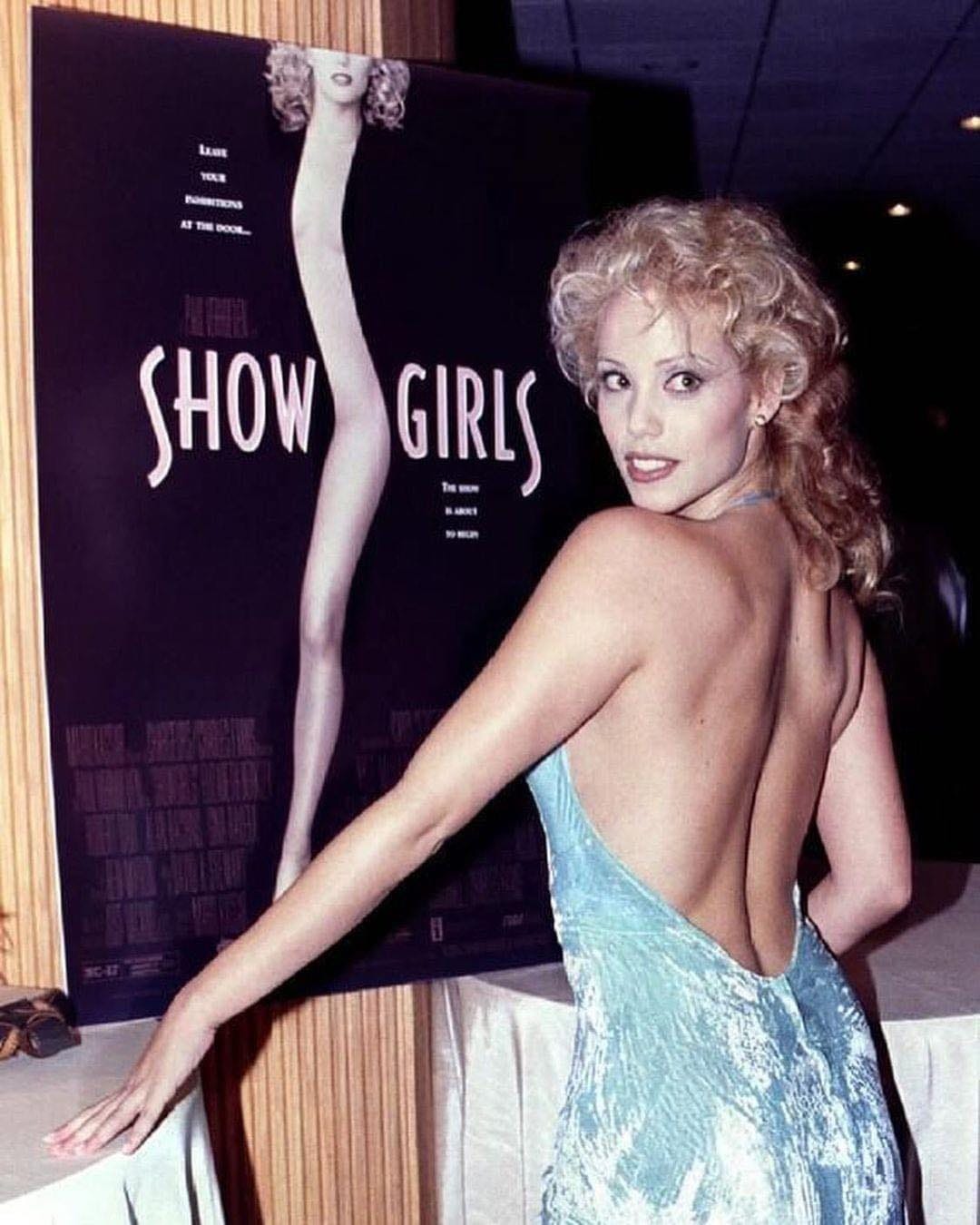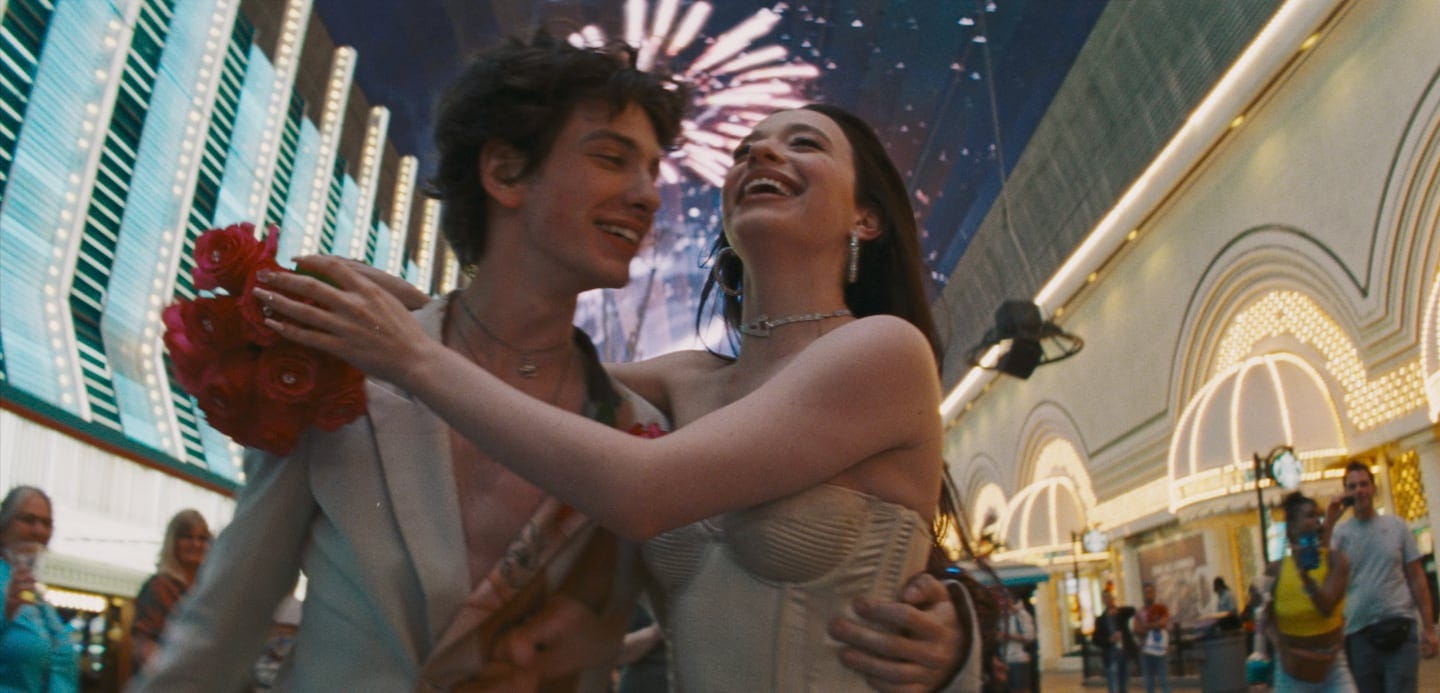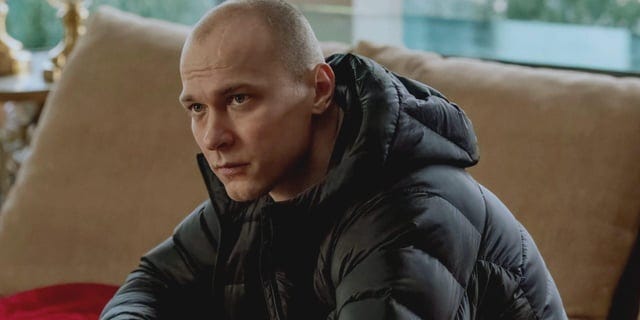On New Years Eve, I was alone (a theme since October 7), so I watched a classic movie (Showgirls) and popped a Xanax at 9pm and fell so hard asleep I didn’t stir until daybreak. Elizabeth Berkley’s performance as a young woman hitching a ride to Las Vegas to become a dancer is still something, and the movie is historic for being the first of its certification to receive such wide distribution in movie theaters. It was panned in total at the time. Crucified. Not a single critical review was positive. Ireland banned the film. (Likely to avoid teaching nuns they had other options for servitude to a male figure). They all missed the point, expressing outrage about the exploitation of nude women. Outrage! Like none of them had ever seen glossy trash before, or really understood that beneath the surface of Hollywood is the world’s worst kept secret human trafficking business.
The reviews destroyed Berkley’s career (nice Jewish girl, no more). She was dropped immediately and lost her love for performance. But in private the film developed a guilty pleasure following. Showgirls is camp as hell. Over the years the movie has become a cult hit and received something of a public apology. It’s a movie that asks its audience to arrive at its own moral conclusions about stripping and sex work. It asks in a relentlessly over-the-top way how to survive as a young girl in a world full of absolute assholes. It’s cheap in a very expensive way. Like one of those highlighter-yellow Corvettes. Or the way Berkley’s character in the movie pronounces Versace (ver-sase).
I’ve always loved strippers and wanted to run away with one. There’s something I find refreshing, revolutionary and exhilarating about a woman who knows precisely how men see her, and capitalizes on the basic instincts of their species. I don’t judge. I admire, actually. Showgirls is only realistic in the broad sense that it’s a story about a woman who wants to make it so bad she stops at nothing. And her ambition isn’t sexy at all. It’s over-the-top and desperate and quite uncool. Berkley’s character is rigged for success as a result. Or she thinks she is. The men still hold the power. Maybe that’s why so many people hated the film at the time. They didn’t want to be told the facts in 1995. “You are a whore, darling. We all are. We take the cash. We cash the check. We show ‘em what they wanna see.” Showgirls was a little too honest.
A couple of months ago, I was again alone on a Saturday night and I watched a movie I haven’t been able to stop thinking about. Not because it’s about strippers, but because it’s about being a woman. Because it’s about love. It’s about vulnerability. It’s about how a generation has been socialized to be positively allergic to it. It’s about stripping and sex work, but it’s also about trauma and pain and life.
(By the way, Anora is in another league and class from Showgirls, but they are films of different eras. Showgirls is profane; Anora is profound. Showgirls is sleazy; Anora is special. It deserved all the awards that it won in real time).
Quickly: Anora is a sort of Cinderella story about a New York stripper (stripper name: Ani) who meets the son of a Russian oligarch and quickly marries him, only to be lulled into a series of ever-increasingly unfortunate events in which… well, she doesn’t find her ruby slippers and live happily ever after. Or, does she?
In Anora, sex work becomes the prism and the device by which we understand how men have dictated how women should behave; how we should find power. It speaks to a universal epidemic of disconnection and individual isolation that goes far beyond the parameters of sex work. I’d argue that any woman – or indeed man – who has been objectified or assaulted – not necessarily raped – can identify with the war Anora is facing; the struggle between self-ownership and independence versus a desire to connect and find “true love”. Anora almost presents sex work as the obvious solution: ie, why wouldn’t you be a sex worker in a world that is rigged against your success, your safety, your happiness? It’s not glorified but it’s presented as a smart choice. A life without fear, except for the fear you’ve learned to make your bitch. Empowered. And yet the slut life comes at a cost.
I would define my generation as sex positive, and that my experience in my social circles has been one of people incessantly grappling with the question of love’s compatibility with sex. In Anora, sex work’s inherent survival mode necessitates a divorce of the two (ie, divorcing “connection”, I guess, and sex). That is a fantastic Petri dish for exploring the relationship between sex and love; safety versus vulnerability. It explores the double life of the sex worker, the adoption of a character, the strength and resolve required to do the sex work, the sense of final ownership over the physical experience of sexual intimacy and the fairness of the negotiation, as opposed to what society usually dictates and judges as a form of female exploitation.
Let’s ask a genuine question: who gets to judge that honestly? Who gets to be the judge of how women choose their own exploitation journey? Every woman is exploited in some shape or form by almost everyone we meet. (If not everyone). We are judged for who we are, for our choices - jobs, fashion, partners, whether to have children, how to have children, when and where. We are judged for who we are not. We are told how to use our voices, and what causes to adopt, how to speak when we’re adopting them for someone else’s benefit at the expense of our own fastly-running-out time. We are judged every second of our lives. Fuck it, we are judged in our deaths.
British feminist firebrand Julie Bindel argues in the book Feminism For Women: there is never a time when women’s rights are not threatened, so we must behave as though they always are. (Note: because they are). We are always asked to demote our own safety and rights for the accommodation of others, who are not guaranteed to protect us. How cute and feminine, right? (Rapunzel, do not even think about coming down!)
So when I watched Anora, I saw a capture of the freedom of sex work for young women, the sisterhoods and the nemeses (presented in the club scenes), the clean safety of the transaction (the club’s set-up, the self-made terms of Ani’s time spent with the male lead who she marries, Vanya), the risk and the reward, the rush and the emptiness. But I also saw a capture of a deeply emotional wall, portraying how Anora longs for authentic love, is good at pretending she’s found it, but knows somewhere inside that it isn’t real. She strives to see something in Vanya that isn’t there, clawing to find empathy for a man-child who doesn’t empathize with her at all. He doesn’t see her beyond the mechanics of the sex work. Her job involves a transactional boundary that offers the allure of safety, but hinders the emotional intimacy she’s been craving the most.
And there’s a disconnect between Anora’s public narrative as Ani (recognition, approval, empowerment) and her private truth (loneliness, misunderstanding, emotional cost); a tension between the exterior and her internal exposure. Anora asks the question of whether you can seek authentic love as a sex worker, or even just as a person objectified. Vanya never sees her as anything other than a replaceable escort who he had “fun” with, and performs their relationship again with her nemesis the instant the facade breaks. Whenever she thought he might open up to her whether as a girlfriend or then as a wife, he refused to engage, playing video games, or ultimately running from her the second his own freedom was at stake and the fantasy was shattered. As her commitment grew stronger, his vanished. That portrayal of love-bombing and subsequent possessiveness is relatable to anyone who has experienced coercion or narcissistic abuse.
Even more compelling is that ultimately when pushed, Anora knew she didn’t love Vanya. She was in love with the role Vanya had allowed her to play as wife/girlfriend. Frankly, it was a better deal than working in the club. As the film reaches its climax, Anora does meet a man who understands she’s a sex worker and doesn’t pursue the transaction. His name is Igor; a heavy hired by Vanya’s family to break the marriage up. In once scene, Igor is utterly bamboozled by Ani’s suggestion that he wanted to rape her. As if to prove the lunacy of the claim, Ani is then able to shower in Vanya’s house during her last night there without any threat from him. She knows Igor is there to protect her over Vanya, even though that is anathema to her life, her sex work, her sense of identity and independence even. She doesn’t want a protector. She wants control. So Anora avoids what is a clear authentic connection because she doesn’t know how to behave in one.
[Spoiler alert for those who haven’t seen the film]
In the final scene, she recognizes a bond she has with Igor rooted in vulnerability, exposure, protection, care, even friendship. The audience exhales when Anora is finally alone with Igor flying home from the end of the nightmare. She only knows how to repay Igor’s kindness by acting out her sex work. But it’s not the same kind of sex we’ve seen throughout the movie (high octane, pornographic performances of “safe” sex). In a run-down car on a bleak morning in the snow, Igor and Anora are framed in broad daylight. No thrills. No tricks. Igor is her safe unsafe, if you like. A future potential place to explore a type of intimacy she’s perhaps never experienced with someone who doesn’t objectify her. The ending involves an emotional exposure without any resolution, after Anora has a violent reaction to Igor simply trying to kiss her, which contrasts with the sex worker’s narrative around control. The kiss is the polar opposite of everything she’s accused him of, and everything she’s subjected herself to. Her vulnerability is left hanging in mid air. Cue: credits. Damn.
As is true of all masterful film-making, the ending is a discussion in and of itself, invoking a myriad of reactions. The viewer reacts to the mirror it presents. For me, the ending showed how hard it is to open up beyond the safety of a performative transaction, but also how brave it is to try. It showed me that perhaps the worst thing that happened to Anora (imagining she’d fallen in eternal love with her captor Vanya, only to be abandoned and cast out as a “prostitute”, ie not seen by him at all), also included an opportunity to connect in the way she is too scared to admit she desires the most. Anora doesn’t know any other way of engaging with Igor’s honesty so she breaks down while faced with something she really wants. She loses control during the first moment of true catharsis in the movie. It’s the bravest thing she does. It’s fucking perfect actually.
We knew throughout that Ani and Vanya didn’t love each other. It’s Igor who wants to call her by her real name, Anora, ie not by Ani, the character she shields herself with. The movie is called Anora. The movie is about the soul beyond the body.
Anora doesn’t just see the truth of sex workers and offers it the ultimate tenderness; it sees the raw humanity of surviving a man’s world. It sees why the cards are stacked against a happy ending for women who want the whole kingdom that they can see. Women and marginalized men survive in all manner of ways, sex work included. Whether it’s Showgirls or Anora, the underlying pursuit is for safety in a treacherous society. There’s no shortcut for finding love in a hopeless place. It’s only when we find our way back to ourselves, when we jump back into our bought and paid-for bodies, that we can begin to trust the whispers of our hearts. Devastating. Beautiful.





Your writing 💯
Incredibly powerful assessment of how we value ourselves as humans in the context of sex, both physically and psychologically. I’m very excited to see you return to your roots because I discovered you through your advocacy. (Twat was thoroughly hilarious and gravitas!)